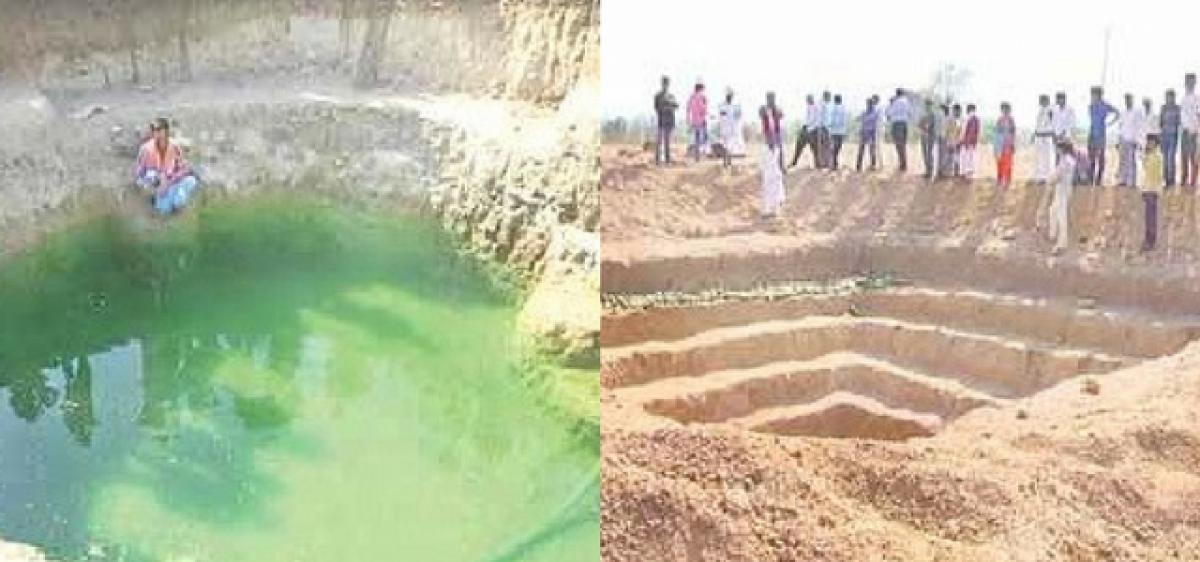Live
- TTD to issue tokens for Vaikunta Dwara Darshan from January 9
- QR-coded tag to trace missing kids yields good results
- Efforts on to strengthen coop sector: Atchanna
- Hyd’bad Book Fair organises book inspiration programmes
- Mega job mela on Dec 28
- Amit Shah’s removal from Union Cabinet demanded
- SCR to run weekly special trains
- TG to roll out Clean and Green Energy Policy soon: Bhatti
- Youth must take up farming, allied activities: Dhankhar
- Blankets, fruits distributed to mark Vajpayee’s birth anniv
Just In

With the implementation of water conservation measures as part of the NREGA on a war-footing, farmers in the Agency mandal of Indravelli have kept drought at bay. They are cultivating three crops a year under open wells and farm ponds.
Adilabad: With the implementation of water conservation measures as part of the NREGA on a war-footing, farmers in the Agency mandal of Indravelli have kept drought at bay. They are cultivating three crops a year under open wells and farm ponds.
As a result, migration of tribals from the mandal has come to a halt and farmers in other villages are rearing to emulate Indravelli farmers. Five years ago, farmers of Vayupeta, Rajampeta, Pochampalli and Heerapur reeled under severe impact of drought.
They suffered losses because of withering away of crops. The people faced severe drinking water shortage. Migration of farmers was reported from the areas to support their families. The villagers adopted resolutions at grama sabha to conserve every drop of water.
They decided to take up water conservation measures as part of the NREGA works. They vowed to improve the ground water table. Three members from each household dug open wells as part of the MNREGA works. They dug agriculture wells with specifications 8x8x16 metres.
Hundreds of such wells have been dug in Rajampeta and Vayupeta villages and practicing agriculture with the abundance of water in the wells. They are growing crops in the once barren lands.
They dug water harvesting structures in each house to improve the ground water table. There is water up to three metre height in the six-metre-deep farm ponds.
According to a tribal Atram Tirupati, he cultivated cotton twice with the water from the farm pond, which, he said was also useful in preventing soil erosion during rainy season.
Even in the open wells water is struck at a depth of 6-8 metres. Even at the height of summer, the tribal farmers raised red gram, cotton, gingelly and bajra under the open wells. A farmer Digambara Rao harvested 30 quintals of jowar in an acre.
Another farmer Madavi Sakku said that their irrigation problems got over because of the conservation of water. To conserve water, they also dug small ponds to increase groundwater table, which will ensure that water is available in open wells all through the year.
According to another tribal farmer Atram Kesav, the ponds are helping them prevent their crops wither away. Moreover, the absence of the ponds will pose drinking water problems to the cattle.
A farmer Bhujanga Rao said that he earned Rs 15,000 towards wages for digging open wells as part of the NREGA. Keeping in mind long-time benefit, he said open wells have been dug. He said he raised cotton in three acres under the open well.
DRDA project director Rathod Rajeswar noted that the NREGA works taken up to give longstanding benefits to tribal farmers bore fruit. The once migrant tribal farmers are now raising three crops in a year.
The officials are encouraging tribal farmers to dig a farm pond in their fields, he said. The migration of labourers in Indravelli has come to a standstill and more and more farmers are evincing interest to emulate the Indravelli farmers.

© 2024 Hyderabad Media House Limited/The Hans India. All rights reserved. Powered by hocalwire.com







